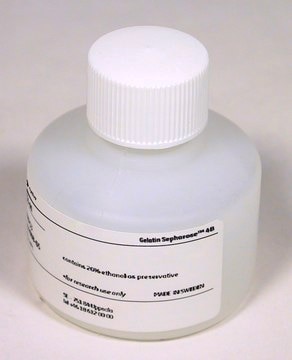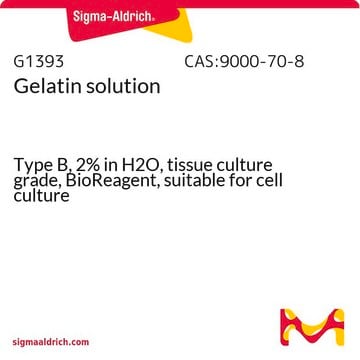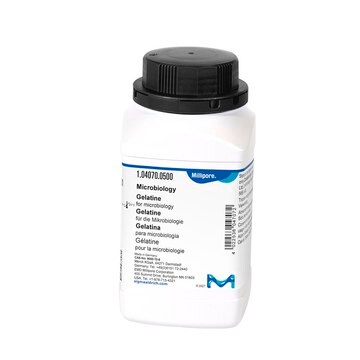Recommended Products
biological source
protein from Porcine skin
Quality Level
form
saline suspension
extent of labeling
≥3 mg per mL
matrix
cross-linked 4% beaded agarose
matrix activation
cyanogen bromide
matrix attachment
amino
matrix spacer
1 atom
storage temp.
2-8°C
Application
Gelatin-Agarose has been used:
- in the isolation of exosomes from human plasma
- to obtain fluorescent labeled enzyme For fluorescence photobleaching recovery (FPR) experiments
- in the purifaction of matrix metalloproteinase-9 by affinity chromatography
Gelatin-agarose is an agarose in saline suspension used for affinity chromatography, protein chromatography and specialty resins. Gelatin-agarose has been used in studies informing pathology-related processes of tissue remodeling as well as sperm-egg interactions in mammals.
Physical form
Suspension in 0.5 M NaCl containing preservative
Storage Class Code
10 - Combustible liquids
WGK
WGK 3
Certificates of Analysis (COA)
Search for Certificates of Analysis (COA) by entering the products Lot/Batch Number. Lot and Batch Numbers can be found on a product’s label following the words ‘Lot’ or ‘Batch’.
Already Own This Product?
Find documentation for the products that you have recently purchased in the Document Library.
Customers Also Viewed
R P Kitson et al.
Journal of immunology (Baltimore, Md. : 1950), 160(9), 4248-4253 (1998-05-09)
We have previously documented that adoptively transferred IL-2-activated NK (A-NK) cells can accumulate within cancer metastases. Electron microscopic studies of pulmonary metastases have revealed that adoptively transferred A-NK cells that accumulate within metastases bind to endothelial cells and are able
Annick Bergeron et al.
Molecular reproduction and development, 71(4), 461-470 (2005-05-14)
Mammalian seminal plasma contains among others, two major families of proteins, namely spermadhesins and those proteins that contain fibronectin type II domains. Spermadhesins are the major proteins of boar and stallion seminal plasma and homologous proteins have been identified in
S A Corbett et al.
Blood, 88(1), 158-166 (1996-07-01)
Plasma fibronectin (pFN) cross-linked to fibrin during the injury response provides a provisional matrix required for cells to begin tissue repair. Using a synthetic matrix of pFN and fibrin as a substrate for cell adhesion and spreading, we have determined
G A Piazza et al.
The Biochemical journal, 262(1), 327-334 (1989-08-15)
Dipeptidyl peptidase IV (DPP IV) is a cell surface glycoprotein which has been implicated in hepatocyte-extracellular matrix interactions [Hixson, DeLourdes, Ponce, Allison & Walborg (1984) Exp. Cell Res. 152, 402-414; Walborg, Tsuchida, Weeden, Thomas, Barrick, McEntire, Allison & Hixson (1985)
Mélanie Boisvert et al.
Biology of reproduction, 70(3), 656-661 (2003-10-31)
Bovine seminal plasma (BSP) contains a family of major proteins designated BSP-A1/A2, BSP-A3, and BSP-30kDa (collectively called BSP proteins) that bind to sperm at ejaculation and potentiate sperm capacitation. Homologous proteins have been identified in stallion, boar, goat, and ram
Our team of scientists has experience in all areas of research including Life Science, Material Science, Chemical Synthesis, Chromatography, Analytical and many others.
Contact Technical Service












